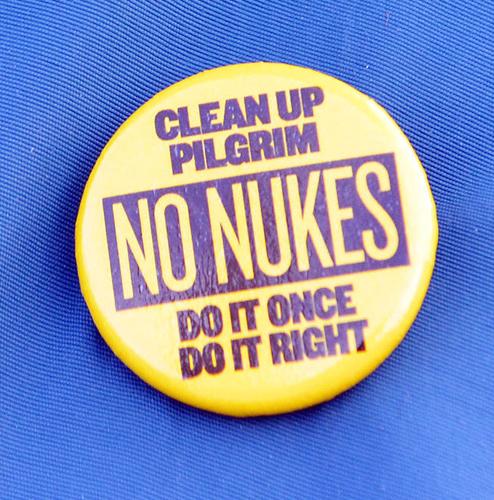MassDEP To Holtec: Stop Evaporating Nuclear Wastewater
By TAO WOOLFE | Oct 13, 2023

A button worn during a protest in Plymouth
ENTERPRISE FILE PHOTOGRAPH/SAM DRYSDALE
The Massachusetts Department of Environmental Protection has sent a letter warning Holtec International about evaporating radioactive wastewater without a permit.
The letter, which was dated September 25—but not mentioned at a meeting of the Nuclear Decommissioning Citizens Panel that same day—says any such evaporative methods, “may be subject to MassDEP air quality permitting.”
Experts at that meeting talked about the “new” method of eliminating some of the remaining water in the spent fuel pool by using heaters to evaporate the water and vent it into the air.
The amount of radiation released into the atmosphere would be minimal, the experts said.
The warning letter to John Moylan, Holtec’s site vice president, says, however, that Holtec—the company decommissioning the Pilgrim Nuclear Power Plant—may also be in violation of the federal Clean Air Act and other US Environmental Protection Agency regulations.
The letter was written by Seth Pickering, MassDEP’s deputy regional director for the southeast region.
Mr. Pickering referred media questions to Edmund Coletta, a spokesman for the department. Mr. Coletta said the emissions already released did not trigger any alarms, but that future releases should be discussed with MassDEP.
More specifically, Mr. Coletta said in an email yesterday that “emissions related to the recent use of immersion heaters are not subject MassDEP air permits for the facility and did not trigger any threshold that would have required Holtec to apply for a permit.”
He added, however, that “MassDEP has informed Holtec that prior to implementing any potential plan to dispose of water through evaporation, they need to contact MassDEP to discuss the potential applicability of any air quality permitting requirements.”
Meanwhile, environmentalists following the Holtec decommissioning process said they were pleased to see the DEP letter.
“It’s important that the state is stepping up to protect our environment,” said Diane Turco, founder and director of Cape Cod Downwinders, an environmental watchdog group.
Ms. Turco said she received a copy of Mr. Pickering’s letter on Friday, October 6.
“I don’t know why this was not discussed at the NDCAP meeting, but I’m glad the state is taking a stand,” Ms. Turco said.
Ms. Turco was also the recipient of an anonymous letter in August, apparently from a Holtec employee, that spelled out Holtec’s intention to evaporate the toxic wastes into the atmosphere through the power plant’s ventilation system.
It was reported that Holtec installed nine of the heaters at Pilgrim in March and used them through June to heat the irradiated water to 117 degrees.
Holtec, which has said it has discontinued evaporating wastewater, had previously raised the ire of environmentalists, residents and legislators with its proposal to discharge more that one million gallons of irradiated water into Cape Cod Bay.
Besides discharging the water into the bay or evaporating it, Holtec has two other options: ship the waste offsite to an underground storage facility; or store it in casks at the power plant.
Residents and legislators overwhelmingly prefer the option of shipping the wastes offsite.
Holtec has maintained that it should be allowed to discharge the wastewater into Cape Cod Bay because, the company has said, the radiation levels are too low to cause damage to people or sea life.
The company has also said that discharging wastes into the bay has taken place many times over the years, with no ill effects.
The Massachusetts Department of Environmental Protection has tentatively denied a discharge permit to Holtec and recently concluded a public comment period soliciting opinion about making the discharge denial permanent.
The department received more than 700 responses and is expected to make a determination in the coming weeks, a spokesman said at the Monday meeting.
The state DEP has focused on the state’s Ocean Sanctuaries Act as the legal basis to deny Holtec’s permit to discharge the nuclear wastewater into the bay.
A legal team hired by the environmental watchdog group, the Association to Protect Cape Cod, found that the Massachusetts Ocean Sanctuaries Act of 1971 prohibits dumping or discharging industrial wastes into protected Massachusetts waters.
Barry Potvin, chairman of the Plymouth Board of Health, was among many who have expressed concern about the release of specific pollutants.
“We’re concerned about tritium, which cannot be removed by any means,” Dr. Potvin has said.
The Nuclear Regulatory Commission, which is charged with overseeing nuclear power plant decommissioning, has said the concerns are overblown.
“All reactors have spent fuel pools. The releases happen, they are pretty much unavoidable,” Harold W. Anagnostopoulos, the Nuclear Regulatory Commission’s lead decommissioning inspector at Pilgrim said at a recent public forum.
“The amount of tritium and other nuclear particles released would be “insignificant,” Mr. Anagnostopoulos said.
Other experts have said that the evaporation method is especially dangerous because the discharge is difficult to measure and there is no filtration system used.
“Even very low doses can cause lifelong damage and increase the risk of cancer over a lifetime,” said Dr. Brita Lundberg, speaking on behalf of the members of the Greater Boston Physicians for Social Responsibility, an organization that monitors public health risks.
Patrick O’Brien, Holtec’s director of government affairs and communications, said Holtec has not responded to MassDEP’s letter.
Mr. O’Brien has said, however, that evaporation of wastewater is routine.
“Evaporative releases are monitored and part of our annual environmental reporting and have occurred continuously since the plant began operations in 1972,” Mr O’Brien said last month.
MassDEP has not yet determined whether Holtec’s discharge permit should be permanently prohibited, Mr. Coletta said, and no date for the decision has been announced.
The state department of public health continues to monitor samples taken from Pilgrim during the decommissioning process, Mr. Coletta said.
- Log in to post comments


